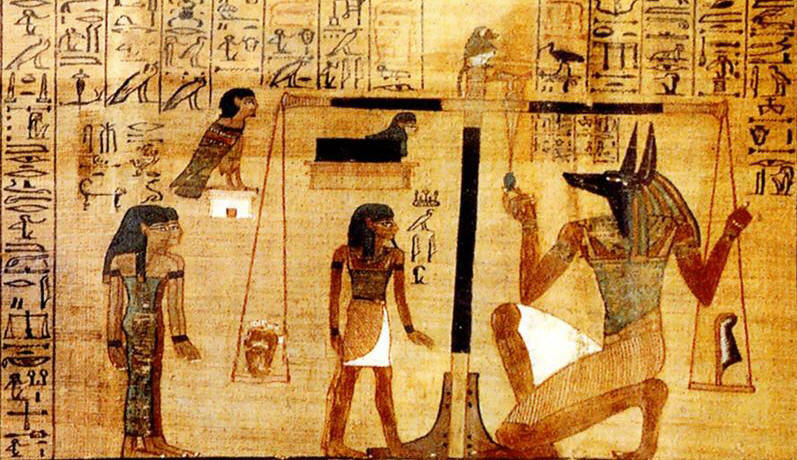 According to the ancient Egyptian belief on afterlife, it was believed that as part of judgment, the dead person addressed forty-two deities by name, declaring to each that he/she was innocent of a specific fault such as murder, theft, lying, blasphemy, and stealing of offerings from the temples of the gods. This was known as the protestation of innocence. Following the protestation of innocence, the dead person’s heart was weighed against the ‘Feather of Truth’ to see if it was pure. If the heart was heavier than the feather (with lies), it was eaten by the devourer (an organism that supposedly had a crocodile’s head, a leopard’s front legs and the back legs of a hippopotamus) and that person ceased to exist forever. In order to live forever, the dead person had to convince the gods that they were free from evil.
According to the ancient Egyptian belief on afterlife, it was believed that as part of judgment, the dead person addressed forty-two deities by name, declaring to each that he/she was innocent of a specific fault such as murder, theft, lying, blasphemy, and stealing of offerings from the temples of the gods. This was known as the protestation of innocence. Following the protestation of innocence, the dead person’s heart was weighed against the ‘Feather of Truth’ to see if it was pure. If the heart was heavier than the feather (with lies), it was eaten by the devourer (an organism that supposedly had a crocodile’s head, a leopard’s front legs and the back legs of a hippopotamus) and that person ceased to exist forever. In order to live forever, the dead person had to convince the gods that they were free from evil.
Unlike this belief, where eternal life is dependent on the person’s own ability to convince the gods of his or her righteousness, the Bible states that it is NOT an individual’s personal efforts in this life or the next that purifies the heart and makes on right (without falsity or lies) before God. It is by faith in Jesus Christ and not by our own works that one can be saved (Ephesians 2:8-9). It is only by belief in Jesus Christ that righteousness is imputed on us and this makes us free from evil, and creates in us a clean heart (Psalm 51:10) that can be weighed on any judgment scale and comes out not only light from evil desires, but also right before God.
James 2:@3 (KJV)
23 And the scripture was fulfilled which saith, Abraham believed God, and it was imputed unto him for righteousness: and he was called the Friend of God.
Romans 4:20-24 (KJV)
22 And therefore it was imputed to him for righteousness.
23 Now it was not written for his sake alone, that it was imputed to him;
24 But for us also, to whom it shall be imputed, if we believe on him that raised up Jesus our Lord from the dead;
25 Who was delivered for our offences, and was raised again for our justification.


Leave a Reply